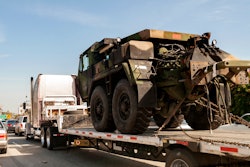Whether you have 10 trucks or 10,000, you can’t escape the fact that one 80,000-pound tractor-trailer operates pretty much the same as any other. So while the 10,000-truck carrier may have a greater likelihood of experiencing a high-profile truck-related crisis, the results are the same. In fact, for a small- or medium-size carrier, the stakes may be higher because your financial resources aren’t as great – either to withstand the fallout or to respond to inaccurate allegations in the media. How should you prepare for and handle a crisis?
Prepare in advance. You never know when or where a crisis will strike, so you should prepare as if you would have to respond at any moment. Compile or buy a list of news outlets with phone and fax numbers as well as e-mail addresses. Consider opening an account with the leading news release and media contact operations, such as PR Newswire (www.prnewswire.com) or BusinessWire (www.businesswire.com). Many of these companies charge little or nothing to set up an account and charge you on a per-use basis.
Larger organizations might consider a more comprehensive and robust system designed specifically for crisis communications as well as routine public relations. For example, AudienceCentral (www.audiencecentral.com) operates a system called PIER (Public Information and Emergency Response) that was created out of strategic communications firm Bacon and Co.’s involvement in major environmental and industrial crises.
Respond instantly. Although you don’t want to jump the gun and issue a news statement on an event nobody considers newsworthy, you do want to take the lead when media coverage is inevitable. By announcing the incident first, you can frame the terms of inquiry.
Immediate involvement is crucial because once the public views your company as a villain, it’s extremely difficult to change that attitude, says Paul Grey, CEO of AudienceCentral. The term for this dynamic is anchoring, and once you are anchored as a bad guy, everything you do or say is framed in relation to this presumption, he says.
In responding, avoid “no comment.” Whether it’s fair or not, “no comment” sends the message you are hiding something. Instead, you are much better off stating – if it’s true – that you don’t yet have all the facts and that you will respond when you are informed.
Seek out friendly authorities for support. It may be helpful to have others make at least vague and general statements that could thwart a presumption against you. For example, if a high-profile crash involves both a large truck and one or more automobiles, you quietly might encourage someone from a state or national association to point out that according to both government studies and the AAA Foundation, the automobile driver is at fault more than 70 percent of the time.
Other trucking interests have a vested interest in a positive perception of large trucks. Your goal is not to blame another party but rather to discourage an assumption that you are at fault – at least until all the facts are in.
Crisis communications
The following are recommendations from the Public Relations Society of America for communicating with the media in a crisis:
- Bring the situation under control as much as possible. Protect people first and then property. Try to judge the situation’s newsworthiness. Don’t create a crisis by communicating unnecessarily. Often, it’s not a situation meriting media attention.
- Get facts: Who, what, where, when, why, how, what next.
- If necessary, activate your crisis management team. Act quickly, and spare no expense in distributing the information you believe the media and others should have.
- Provide as much information to the media as possible. Remember, they will get information – possibly inaccurate information at that – from other sources.
- Don’t speculate. If you don’t know the facts, say so and promise to get back to the media as soon as possible. Then follow through on that commitment.
- Protect the integrity and reputation of the organization.
- Report your own bad news. Don’t allow another source to inform the media first.
- Perform an act of goodwill after a crisis when possible.
Crisis communication planning can help you deal effectively with disasters, emergencies or other unexpected events that may cause unfavorable publicity.








